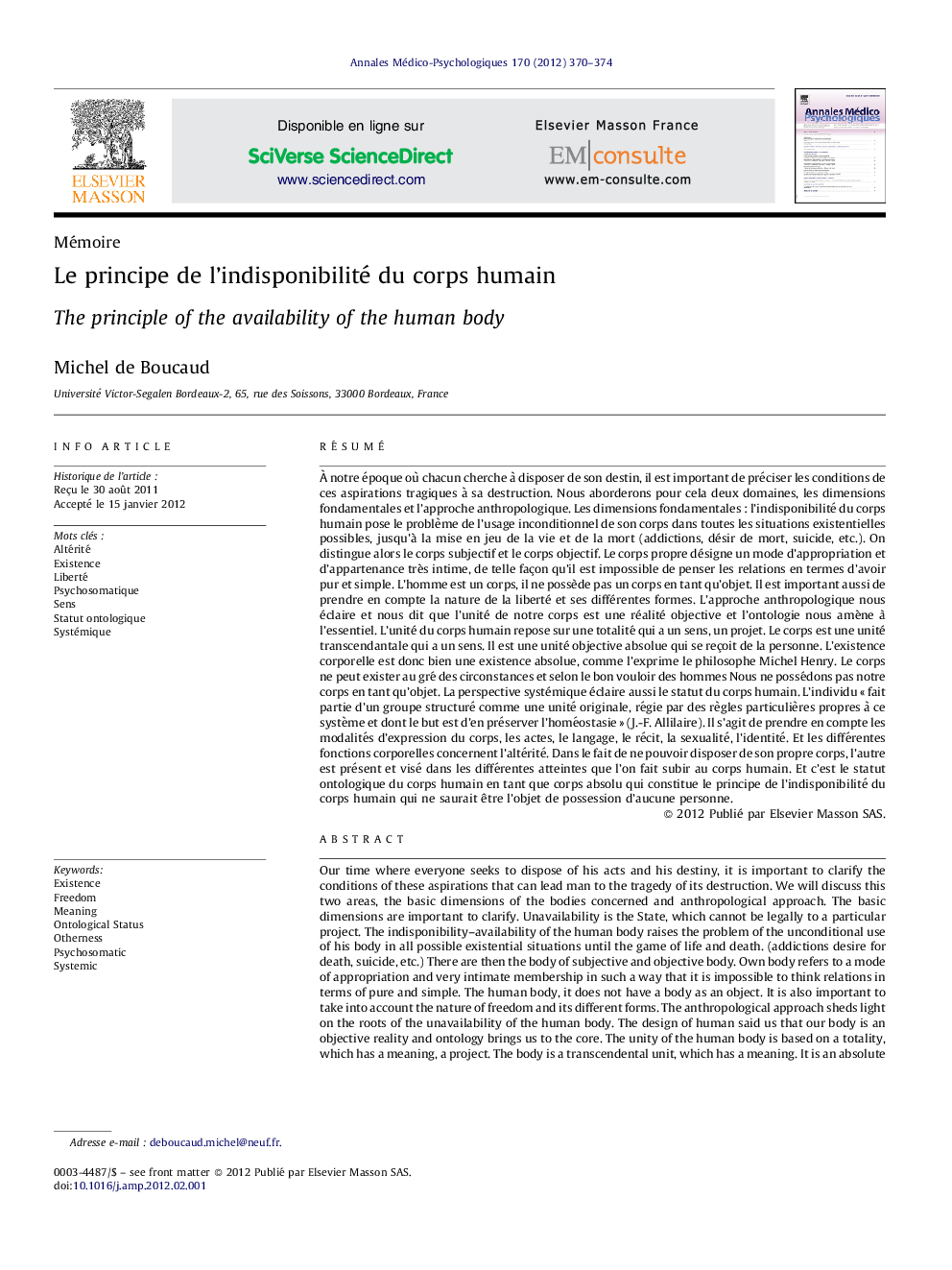| Article ID | Journal | Published Year | Pages | File Type |
|---|---|---|---|---|
| 313472 | Annales Mdico-psychologiques, revue psychiatrique | 2012 | 5 Pages |
RésuméÀ notre époque où chacun cherche à disposer de son destin, il est important de préciser les conditions de ces aspirations tragiques à sa destruction. Nous aborderons pour cela deux domaines, les dimensions fondamentales et l’approche anthropologique. Les dimensions fondamentales : l’indisponibilité du corps humain pose le problème de l’usage inconditionnel de son corps dans toutes les situations existentielles possibles, jusqu’à la mise en jeu de la vie et de la mort (addictions, désir de mort, suicide, etc.). On distingue alors le corps subjectif et le corps objectif. Le corps propre désigne un mode d’appropriation et d’appartenance très intime, de telle façon qu’il est impossible de penser les relations en termes d’avoir pur et simple. L’homme est un corps, il ne possède pas un corps en tant qu’objet. Il est important aussi de prendre en compte la nature de la liberté et ses différentes formes. L’approche anthropologique nous éclaire et nous dit que l’unité de notre corps est une réalité objective et l’ontologie nous amène à l’essentiel. L’unité du corps humain repose sur une totalité qui a un sens, un projet. Le corps est une unité transcendantale qui a un sens. Il est une unité objective absolue qui se reçoit de la personne. L’existence corporelle est donc bien une existence absolue, comme l’exprime le philosophe Michel Henry. Le corps ne peut exister au gré des circonstances et selon le bon vouloir des hommes Nous ne possédons pas notre corps en tant qu’objet. La perspective systémique éclaire aussi le statut du corps humain. L’individu « fait partie d’un groupe structuré comme une unité originale, régie par des règles particulières propres à ce système et dont le but est d’en préserver l’homéostasie » (J.-F. Allilaire). Il s’agit de prendre en compte les modalités d’expression du corps, les actes, le langage, le récit, la sexualité, l’identité. Et les différentes fonctions corporelles concernent l’altérité. Dans le fait de ne pouvoir disposer de son propre corps, l’autre est présent et visé dans les différentes atteintes que l’on fait subir au corps humain. Et c’est le statut ontologique du corps humain en tant que corps absolu qui constitue le principe de l’indisponibilité du corps humain qui ne saurait être l’objet de possession d’aucune personne.
Our time where everyone seeks to dispose of his acts and his destiny, it is important to clarify the conditions of these aspirations that can lead man to the tragedy of its destruction. We will discuss this two areas, the basic dimensions of the bodies concerned and anthropological approach. The basic dimensions are important to clarify. Unavailability is the State, which cannot be legally to a particular project. The indisponibility–availability of the human body raises the problem of the unconditional use of his body in all possible existential situations until the game of life and death. (addictions desire for death, suicide, etc.) There are then the body of subjective and objective body. Own body refers to a mode of appropriation and very intimate membership in such a way that it is impossible to think relations in terms of pure and simple. The human body, it does not have a body as an object. It is also important to take into account the nature of freedom and its different forms. The anthropological approach sheds light on the roots of the unavailability of the human body. The design of human said us that our body is an objective reality and ontology brings us to the core. The unity of the human body is based on a totality, which has a meaning, a project. The body is a transcendental unit, which has a meaning. It is an absolute objective unit that receives the person. The bodily existence is therefore an absolute existence, as expressed in the philosopher Michel Henry. The body can only exist with the circumstances and according to the good will of men we do not have our body as an object. The systemic perspective also illuminates the status of the human body. “The individual is part of a group structured as an original unit, governed by special rules specific to the system and whose purpose is to preserve the homeostasis” (J.-F. Allilaire). It is to take into account the terms of expression of the body, acts, language, narrative, sexuality, identity. And various body functions concern the otherness, they have to do with the other. Is to have its own body or the body of the other, the other is present and desired in different damage which is caused to the human body. And this is the ontological status of the human body as absolute body, which is the principle of the unavailability of the human body that cannot be the object of possession of any person.
